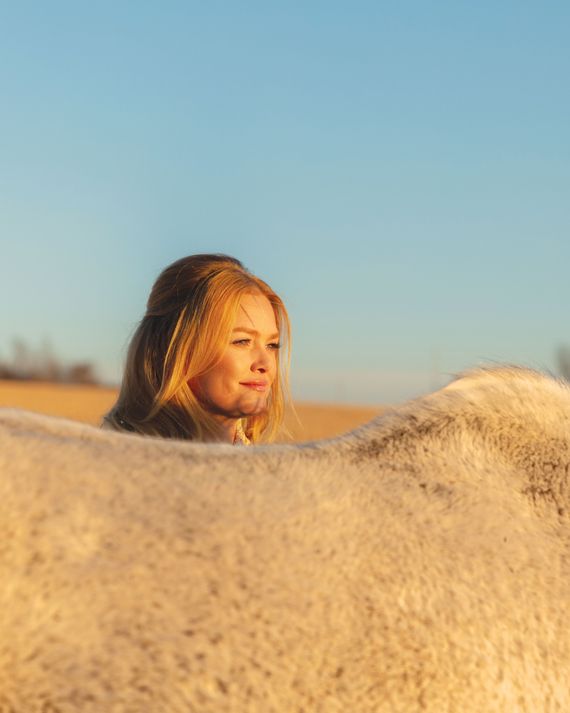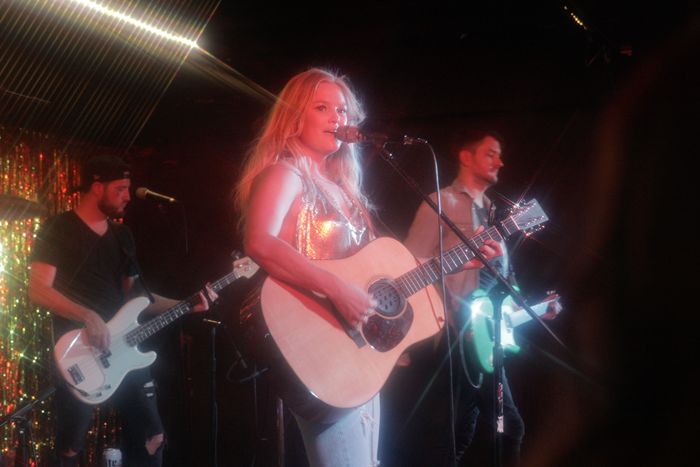
When Hailey Whitters thinks of Shueyville, the small Iowa town south of Cedar Rapids that raised her, she thinks of her Aunt Cindy and Uncle Phil’s farm. The country singer-songwriter didn’t grow up around animals the way others in the Whitters family did, but depending on the year, Cindy would have cows, pigs, chickens, goats, turkeys, or even ducks. “She was homesteading before homesteading was cool,” Whitters jokes, pulling onto the farm’s gravel driveway in a pickup truck borrowed from her mother. In the wood-furnished kitchen of the farmhouse, fragranced by strawberry rolls rising on the counter, Cindy tells us stories about butchering chickens and giving her children milk from their goats rather than from the store. One day, as her kids were helping make homemade sauerkraut, one of them turned to her and asked, “Can we ever live like normal people?!”
Whitters’s new album, Raised, her first with a record label, Songs & Daughters (an imprint of the influential Nashville label Big Loud), is a cinematic rendering of her upbringing in Shueyville. It’s also an affecting argument that places like Iowa are country enough to sing about. Mainstream country music tends to overlook places like the Midwest (never mind Appalachia or the Mountain West) to focus almost wholly on the South. That’s not a surprise to the flyover states. As Iowa journalist Lyz Lenz recently wrote, “The Midwest is the middle child of the nation, pulled between the large population centers of the coasts, misunderstood, overlooked, and constantly whining about it.” And Nashville can be just as exclusive as the coasts — as a newcomer, Whitters remembers assuring Southerners that she was “a different kind of country” but still just as country as them. Raised is for both sides of that exchange: the Midwesterners who don’t hear themselves in the music they’re listening to and the country fans who don’t pay much attention to the Midwest. For anyone else, it’s simply a richly detailed exploration of the meaning a hometown can hold.
Whitters, 32, left for Nashville at 17 expecting to find a career in country music through just one or two doors. Admittedly, she was “starry-eyed”; her parents had to convince her to enroll in college as a safety net. “I thought you played a show and labels came out immediately and signed you,” she remembers. Thousands who had chased that dream before could have told her it wouldn’t happen that way. As she closed in on a decade in the city with minor success — a handful of songwriting credits and a 2015 album, Black Sheep — she’d stopped meeting with labels and was waitressing at Ri’chard’s, where she had previously performed. Nashville had broken her heart, so she wrote a song about it. Whitters independently released “Ten Year Town” in 2019. “I need longer lashes and a shorter dress / To be that overnight success,” she lamented over delicate fingerpicking. “I thought I’d be a big star now / I’m 12 years into a ten-year town.” The song became a critical favorite and caught the attention of country hitmaker Maren Morris, who offered Whitters an opening slot on her tour. Whitters quit waitressing and rode that buzz to release an album, The Dream, which she recorded in 2020 with her now-fiancé, Jake Gear, as producer. The fiddle- and banjo-laden songs were too twangy to make it onto country radio, where middle-of-the-road, pop-oriented fare currently takes priority. Yet Whitters’s reputation in Nashville post–“Ten Year Town,” and a new set of fans including other country stars such as Brothers Osborne and Carly Pearce, carried the album to acclaim. The Washington Post called The Dream “the year’s deepest country album,” while the Nashville Scene named Whitters 2020’s “best country breakout.”
Whereas The Dream was rooted in Nashville, Raised comes to life in Iowa. It’s populated by stories about the people she grew up with. As Whitters drives us past her high-school campus in Cedar Rapids, she tells me people really did call it Cow Pie High — just as she jokes in the music video for lead single “Everything She Ain’t” — “because it was all the farm kids and shit.” Whitters’s song “Our Grass Is Legal” winks at her grandfather’s sod-farming business slogan; a skit by Cindy, who used to answer phones for the company, introduces the track. Another song, “Big Family,” honors Whitters’s five siblings and dozens of aunts, uncles, and cousins. A few of those cousins live on the same street as Aunt Cindy and Uncle Phil. Later, as we pass a billboard about eminent-domain rights, Whitters mentions that one of her cousins who lives in town is fighting to keep farmland that the state wants for the nearby Eastern Iowa Airport. Over sandwiches and beers at Shuey’s, one of Shueyville’s only restaurants, Whitters tells me the place is “like the high-school cafeteria,” and sure enough, her brother walks in to get lunch between stints helping her father with some work. Someone who came in with her brother — not her sister’s ex-boyfriend, who is also in the crew — tells her he just dropped her dad off at a used-car dealership in Cedar Rapids after he’d been talking about buying a Gladiator, the Jeep truck model. When he leaves our table, Whitters admits she has never met him before. “Small-town shit,” she jokes as she slathers mustard onto a pork-tenderloin sandwich, an Iowa specialty that features one of the biggest fried pieces of meat I’ve ever seen.
Coming up as a songwriter and logging cuts for country prestige acts like Martina McBride, Alan Jackson, and Little Big Town, Whitters remembers hearing in industry meetings that the vaguer a song is, the more relatable it will be. It’s a repeated sentiment in Nashville, where a country song about how “country” the singer is, running through a checklist of tired but often true stereotypes, is a guaranteed hit, from Thomas Rhett’s “Country Again” to Chase Rice’s “Drinkin’ Beer. Talkin’ God. Amen.” (Part of Morgan Wallen’s staying power throughout the controversy over his drunken use of the N-word comes from being framed by Big Loud, the same parent label as Whitters’s, as an authentic small-town musician.) “But I think the more specific a line is, the more universal it is,” Whitters says. She longs for songs like Jackson’s “Remember When,” a moving personal history of his relationship with his wife as they aged. “Those are songs that stop you in your tracks.”
Whitters grew up in a golden age of country storytelling — her favorites, from McBride and Trisha Yearwood to Faith Hill and the Chicks, made hits out of narrative tapestries. “As art evolves, maybe we have some dull phases,” she muses, remembering a publisher who told her things were worse in the ’80s. She knows she can’t write trendy pop-country, so she has stopped bothering. “I feel like I’m trying to bring the same integrity and quality of music that I was raised hearing on country radio and applying it to a modern sound,” she says. Whitters finally found a homeplace for that outlook when she signed to Songs & Daughters in 2020, after collaborating with another ten-year-town survivor (originally from central Kansas), songwriter Nicolle Galyon, who founded the label to support the music careers of women in Nashville. Her respected pen has now earned Whitters her first Grammy nomination in the Song of the Year category for “A Beautiful Noise,” by Brandi Carlile and Alicia Keys (two perennial Recording Academy favorites).
The songs on Raised could be about anyone’s life in Shueyville, but their specificity is what makes them feel so intimate and lived in. The album’s emotional center, “Boys Back Home,” deftly flips a bro-country title into a wistful ode to growing up. Whitters can tell the story behind it like it just happened. In high school, the seniors would go to a spot in the woods called Green Castle to drink beers by a fire and camp as a rite of passage. “I just remembered being a teenage girl and all those butterflies,” she says. “Those are the boys that taught me how to drink beer. Those are the boys that taught me how to stick up for myself and not to take any crap from anyone.” Even if you’ve never experienced anything similar, the bridge packs a punch: “I left that town, and we all grew up / But sometimes I still miss that girl that I was.”
Whitters hasn’t lived in Shueyville for about a decade and a half. Lately, she’s been eyeing a second home here. She’d love to move back full time, if only it worked better for Gear, who is a publishing executive (and a fellow Iowan from Muscatine). Not that she could fully leave Nashville either — she still wants to crack the country charts, and that requires industry face time. She will be back in Iowa in just a few months, playing two nights at the DanceMor Ballroom in Swisher, an unofficial sister city to Shueyville on the other side of the highway. The venue has stood in Swisher’s business district since 1929, shutting down for only a few years starting in 2014, before the current husband-and-wife owners bought and restored it. It’s her “favorite little honky-tonk” for the history embedded into features like the original dance floor, stage, and booths — some of the town’s oldest couples can point to the exact one where they met. “I just picture generations of country fans,” Whitters says as we walk across the wooden dance floor past those booths. “You know, rural Iowa comin’ out in their low-cut tops and jeans and dancin’ and drinkin’ beer.”
On our way out, we pass a signed poster from the last time Whitters played the DanceMor in 2019. She mentions to one of the owners, Rebekah, that she has been meaning to ask about having a party there after the rehearsal dinner for her wedding in the fall. She still remembers the thrill of playing here for the first time, between opening those shows for Morris. The line stretched around the venue, and people from the crowd started carrying buckets of beer from the bar across the street when the DanceMor ran out. “I felt like a superstar,” Whitters says. “A hometown superstar.”









